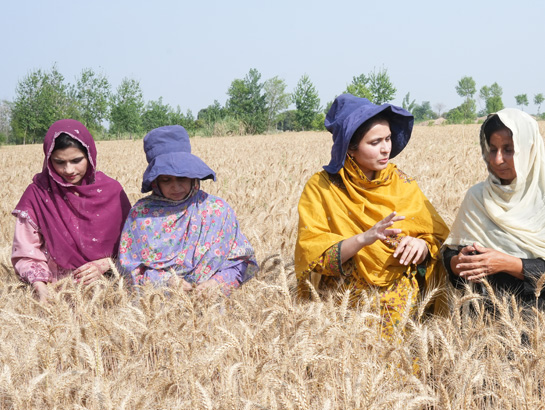Widespread cultivation of biofortified zinc wheat has mobilized considerable investment into the agricultural sector and during the 2024–25 cropping season alone, approximately 178,000 metric tons of certified zinc wheat seeds were planted.
This initiative mobilized over USD 85 million annually in public and private sector investments, with nearly 80 percent coming from private companies. The resulting zinc wheat grain production is expected to reach around 15 million metric tons this year, generating an estimated market value of over USD 5 billion.
Pakistan’s widespread adoption of drought-tolerant, biofortified zinc wheat variety Akbar-2019 has helped avert a major food security crisis. Despite a projected 10 percent decline in total wheat production for the 2024-25 Rabi season due to extreme drought-like conditions, zinc wheat’s resilience maintained substantial yields and cushioned the impact on food supply. Wheat cultivation spanned over 9 million hectares, with estimated grain production reaching 28.42 million metric tons this year. Notably, Akbar 2019 accounted for 42 percent of Pakistan’s total wheat cropping area, contributing an estimated 15 million metric tons of zinc-enriched wheat grain production.
In addition to their climate resilience, biofortified zinc wheat varieties have delivered significant nutritional benefits. Enriched with higher levels of zinc — an essential micronutrient critical for human immune function, child growth, and cognitive development — these wheat varieties address Pakistan’s widespread zinc deficiency, a major public health issue especially among low-income populations.
HarvestPlus played a crucial role in facilitating the development and scaling up of zinc wheat in Pakistan. Their collaborative efforts with partners have paved the way for private sector investment, which is expected to drive further growth. “We are thankful to our long standing partnership with HarvestPlus on development and scaling biofortified crops, driving economic growth in the country and helping to achieve our food security and nutritional goals” said Dr. Javed Ahmad, Director Wheat Research Institute Faisalabad, Pakistan.
Experts emphasize that mainstreaming biofortification into agriculture policy, promoting new varieties, and expanding the approach to other crops can accelerate impact. Private sector engagement, government support, and donor investment are critical to achieving agricultural resilience and better nutrition.
“Biofortified zinc wheat has shown that investing in climate-smart and nutrition-sensitive agriculture is no longer optional — it is essential for the country’s economic development and nutritional security,” said, Dr. Yaqub Mujahid, Country Manager HarvestPlus.
The success of zinc wheat offers a practical solution to ongoing nutritional challenges and food security concerns. Strengthening the value chain for biofortified foods and embedding biofortification into broader agricultural policies will be key steps in building a food-secure and nutritionally healthy nation.
This story was originally published in “The News International”. Here is the link to the original story
